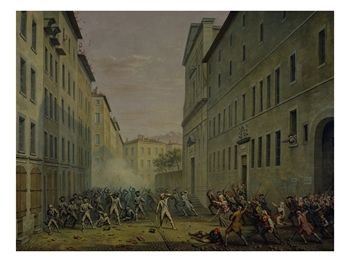
Assembly of Vizille
Encyclopedia
The Assembly of Vizille was the result of a meeting of various representatives in Grenoble, which took place on 7 June 1788. Its purpose was to discuss the events of The Day Of The Tiles
, one of the first revolts preceding the French Revolution
.
 On 7 June 1788, riots broke out all over the town of Grenoble
On 7 June 1788, riots broke out all over the town of Grenoble
. Soldiers sent to quell the disturbances forced the townspeople off the streets. Some sources say that the soldiers were sent to disperse parliamentarians, who were attempting to assemble a parliament. However, the townspeople climbed onto the roofs of buildings, hurling roof-tiles at the soldiers in the streets below, hence the name. This drove royal troops out of the city in the first outbreak of political violence that became the revolution.
. This meeting became known as the Assembly of Vizille. On 21 July, local notables (mainly burghers
, with a large proportion of lawyers) organized the Vizille Assembly, attended by 50 priests, 165 nobles, and 276 representatives of the third estate. The assembly demanded a meeting of the Estates General
(a form of national parliament), with the votes of individual representatives being counted, not just the views of the three estates. Opposition to absolutist monarchy finally came out into the open, with increasing support for its demands, culminating in the meeting of the Estates General
, which coincided with the start of the French Revolution, in 1789.
Day of the Tiles
The Day of the Tiles is an event that took place in the French town of Grenoble on 7 June 1788. It was among the first of the revolts which preceded the French Revolution, and is credited by some historians as being the start of it.-Background:...
, one of the first revolts preceding the French Revolution
French Revolution
The French Revolution , sometimes distinguished as the 'Great French Revolution' , was a period of radical social and political upheaval in France and Europe. The absolute monarchy that had ruled France for centuries collapsed in three years...
.
Day of the Tiles

Grenoble
Grenoble is a city in southeastern France, at the foot of the French Alps where the river Drac joins the Isère. Located in the Rhône-Alpes region, Grenoble is the capital of the department of Isère...
. Soldiers sent to quell the disturbances forced the townspeople off the streets. Some sources say that the soldiers were sent to disperse parliamentarians, who were attempting to assemble a parliament. However, the townspeople climbed onto the roofs of buildings, hurling roof-tiles at the soldiers in the streets below, hence the name. This drove royal troops out of the city in the first outbreak of political violence that became the revolution.
The Assembly
The commander of the troops found the situation so alarming, that he agreed to allow the meeting of the Estates to proceed, but not in the capital. A meeting was therefore arranged for 21 July 1788, at the nearby village of VizilleVizille
Vizille is a commune in the Isère department in south-eastern France.Vizille is home to the Musée de la Révolution Française de Vizille, a rich depository of archival and rare materials devoted to the French Revolution, housed since 1984 in the Château de Vizille, a Monument Historique. The library...
. This meeting became known as the Assembly of Vizille. On 21 July, local notables (mainly burghers
Bourgeoisie
In sociology and political science, bourgeoisie describes a range of groups across history. In the Western world, between the late 18th century and the present day, the bourgeoisie is a social class "characterized by their ownership of capital and their related culture." A member of the...
, with a large proportion of lawyers) organized the Vizille Assembly, attended by 50 priests, 165 nobles, and 276 representatives of the third estate. The assembly demanded a meeting of the Estates General
French States-General
In France under the Old Regime, the States-General or Estates-General , was a legislative assembly of the different classes of French subjects. It had a separate assembly for each of the three estates, which were called and dismissed by the king...
(a form of national parliament), with the votes of individual representatives being counted, not just the views of the three estates. Opposition to absolutist monarchy finally came out into the open, with increasing support for its demands, culminating in the meeting of the Estates General
Estates-General of 1789
The Estates-General of 1789 was the first meeting since 1614 of the French Estates-General, a general assembly representing the French estates of the realm: the nobility, the Church, and the common people...
, which coincided with the start of the French Revolution, in 1789.

